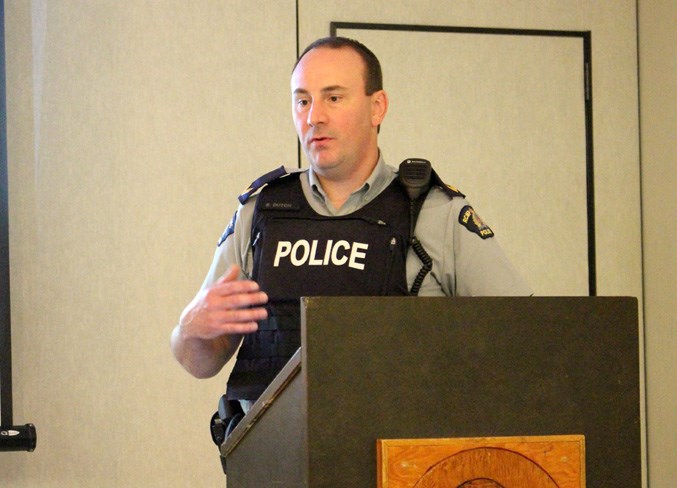There was very low attendance during the Cold Lake RCMP’s town hall.
Only one Cold Lake resident took advantage of the detachment’s public meeting at the Lakeland Inn on Wednesday, July 31, along with members of city council.
“It’s unfortunate that no one came to observe and hear the town hall meeting,” exclaimed attendee Rene Lefebvre. “I know it was a beautiful day, and we’ve been rained out immensely, but it still doesn’t excuse the situation.”
He continued, “They covered everything very well. I know there are problems in Cold Lake, and I was sure people would come and see what’s going on, see what they would come up with to try to instil more questions and get them answered.”
S/Sgt. Scott Buchanan noted the importance of hearing from the community, and offered his thanks to those that did participate.
“Without the public, the police’s hands are really tied. We do rely on the public with tips, information, and support for our daily grind.”
During his presentation, Cpl. Sean Dutch explained there are 17 municipal and 10 provincial members, along with six municipal and three public service employees currently at the detachment.
Cold Lake RCMP’s overall clearance rates, which are when a police investigation leads to a suspect being charged, were 50 per cent for municipal files and 49 per cent for provincial in 2018.
For municipal offences, persons crimes had a clearance rate of 74 per cent, property crimes was 33 per cent, and offences relating to other charges, such as failure to comply, sat at 79 per cent.
Local officers had a 81 per cent clearance rate for persons crimes when it came to provincial criminal code offences, while property-related crimes was 34 per cent, and there was 79 per cent clearance for other crimes.
The boundaries covered by the detachment include the eastern portion of the MD of Bonnyville, the City of Cold Lake, Cold Lake First Nations, and Elizabeth Métis Settlement. After conducting consultations with these stakeholders, the RCMP determined their top priorities moving ahead, which include traffic safety, community engagement, and employee wellness.
Another focus for the RCMP is working on a crime reduction strategy.
“That’s generally in relation to the priority prolific offender checks, and that’s specifically related to compliance and referrals to partner agencies, such as probation and community corrections, and child and family services,” explained Dutch. “That basically means we do offender checks on people that… have curfews on a certain time frame. We focus our energy on doing curfew checks on them, we visit them after hours because we find those small number of people are doing the crime in our community.”
A proactive foot patrol program has been ongoing in the downtown core for about eight months, which Dutch noted has received positive feedback from the residents.
“Just to create visibility, let the clients know that we’re out there, being more approachable to the public. I think the public, especially the business leaders in the downtown, have asked that they wanted to see more of us and not so much just the vehicles driving by occasionally,” he continued.
Indigenous policing services are another focus for the Cold Lake RCMP. Along with getting involved in local events and enhancing their visibility in the communities, members also have the opportunity to take courses to build cultural awareness and education.
The detachment is working toward their goals through ongoing initiatives such as increased visibility at events, joint force operations with military police and peace officers, and their Police Dog Service (PDS) Unit.
Buchanan noted the PDS Unit has been a major positive since it was established in September 2018.
“It makes such a difference in apprehension, because even if we pursue them and they run off into the bush… if you have a dog, it’s amazing the difference in a successful apprehension. It’s been a very good program, and we say ‘thanks’ to the city for funding the position.”
During the question period, Coun. Vicky Lefebvre asked if fentanyl is a problem for the Cold Lake detachment.
Cpl. Marie-Eve Mackenzie-Plante, non-commissioned officer (NCO) with the local General Investigation Section (GIS), said the drug hasn’t been seized recently. She believes another illegal substance has become an issue.
“Methamphetamine is very cheap to produce, and it creates an extreme high… Now what’s happened is people that use crystal methamphetamine are getting involved in property crime and serious persons crimes, because they need to finance (themselves),” she explained.
Buchanan also touched on the topic of vehicle pursuits, and why police may choose not to go after suspects. Due to safety concerns, officers are instructed not to conduct high-speed chases of stolen vehicles unless the suspects pose a risk to the community.
Buchanan explained, “There are situations where we do pursue, and that’s generally when someone has committed a significant offence and is a danger to the public.”
The Cold Lake RCMP has plans to host town halls in the future, and hope to hear from more residents.



